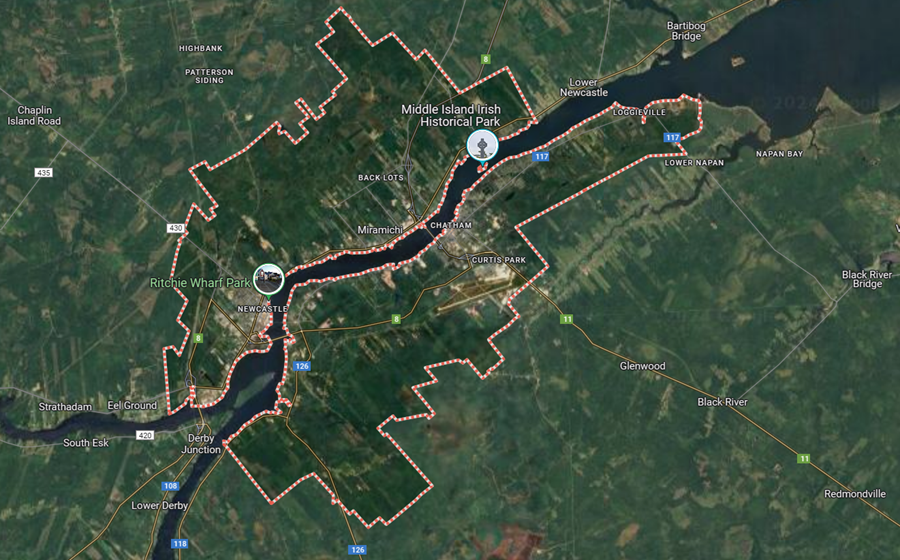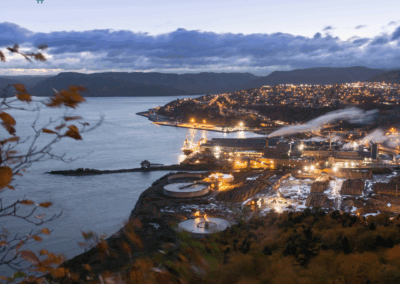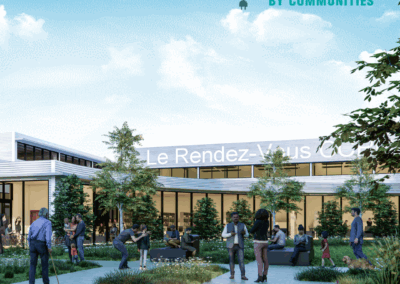Miramichi, New Brunswick – A small city doing its best
“We’re just a small city trying to do its best.” That’s how Darren Row sums up Miramichi’s efforts to save energy and reduce emissions.
As the city’s Director of Engineering, he’s in the thick of those efforts: well aware of the city’s challenges, and focussed on projects that can make the biggest difference.
Miramichi was formed in 1995 with the amalgamation of Newcastle, Chatham and surrounding communities, and grew further when parts of two local service districts were added in 2023. It’s one of NB’s smaller cities by population – but it’s the province’s second largest by area. And that speaks to two of the biggest challenges it faces in its journey to greater sustainability: a big-city area to service, but with a small-city population and budget. A third challenge for Miramichi is aging infrastructure – including some old and inefficient buildings inherited when CFB Chatham closed in 1996.
“So, like many smaller communities, we have a lot on our plates,” Row shares. “That means we need to choose our priorities carefully, and focus on where we can get the biggest bang for our buck.”
One of those priorities has been the design of Miramichi’s sports and health Multiplex, a large new facility that will replace two current recreational centers and one arena.
“Oil-fired boilers in municipal facilities are the biggest sources of emissions under our control,” Row explains. “And when an oil-fired boiler is operating in an old, inefficient building, it’s an even bigger issue – and opportunity.” He singles out the old Golden Hawk building, one of the recreation facilities being replaced by the Multiplex, as an example.
“It was built on the base in the 1950s, and uses 125,000 litres of fuel per year,” he says, “so we’re definitely looking forward to retiring it.”
The Multiplex, which will feature a pool, ice surface, gym and community rooms, will be highly efficient and fully electric. Heat from the ice plant will be recovered and used elsewhere in the building. “Overall, we expect to reduce our energy bill by $200,000 a year, or about 40 per cent.” The new facility is scheduled to open in the fall of 2026.
Other oil-fired municipal facilities on Row’s priority list include Miramichi’s police station and the city’s public works operations building, also a legacy base building.

Transportation is another large source of emissions, because private vehicles are the primary way citizens get around the sprawling community. Miramichi Transit was established in 2009 to offer citizens an alternative. The innovative service operates 24-seat minibuses six days a week on three interconnecting routes that link the major population centers of the city.
“Operating a transit service is definitely a challenge,” says Transit Manager Jason Babineau. “We’re probably the smallest community in the region to have fixed-route service. But it’s gratifying to see that our ridership is back up to pre-pandemic levels, and growing.”
That rebound is thanks in part to innovations like using online tools to offer passes and provide system updates; fine tuning routes to match need and uptake; and offering free passes to high school students. Babineau is also looking into the feasibility of offering transit-on-demand in some neighbourhoods instead of fixed route service; and transitioning to hybrid or electric buses the next time equipment needs replacing.
His suggestions to any community contemplating a similar service? “Get buy-in from your community; start small and scale up as needed; develop a solid communication and marketing strategy; and be patient – success will happen, but probably not overnight!”
To further promote transportation emission reductions, the city has introduced electric and hybrid vehicles to its corporate fleet. It has also helped fund the installation of more than a dozen Level 2 and Level 3 public charging stations across the city.
“Promoting more active transportation is also on our agenda,” Row says, pointing out that some current paved trails on old railbeds are well used. “But it’s a challenge; new trails are pretty major projects that usually involve widening. So our approach is to integrate them into the plans when we do regular infrastructure upgrades.”
Miramichi has also taken steps to make energy savings and emission reduction central to future development and decisions. “The city has adaptation and greenhouse gas emission reduction plans in place, as required by the province,” Row points out. Several by-laws have also been enacted to limit development in flood-prone areas and enhance building codes for expected future conditions. “Ensuring public buy-in is an ongoing task, so it’s actually helpful to have regulations from external jurisdictions like the province or the feds that we can point to, to back us up.”
And what’s his advice to other communities going through the same sustainability journey? “First of all, accept that this is a long-term game; change doesn’t happen overnight.” In other words, craft good messaging in support of priorities, and then be persistent in winning over elected leaders, citizens and other stakeholders.
“Network with other communities; you may find some great ideas that could work in your community too. Strive to integrate sustainability and efficiency into all new projects; that’s usually a lot cheaper than having to come back later and do it as an add-on or retrofit.”
“Finally, take advantage of funding programs that are out there now, including to get some help: temporary staff that you can delegate to, or even a consultant who can lead and manage the process for you.”
Welcome words of wisdom, no doubt, to counterparts in other smaller communities trying to do their best.
ABOUT THE AUTHOR

Carl Duivenvoorden

À propos de 'Powered by Communities'
Established in 2017, Powered by Communities is an awareness-raising, communications and media platform that highlights and celebrates local community energy initiatives taking place across the country, from coast to coast to coast. The platform inspires, informs and engages its readership with stories and articles detailing community energy initiatives being led by local governments, municipalities, Indigenous communities, community groups, non-profits, charities, and enterprising individuals.

À propos de QUEST Canada
QUEST Canada is a registered Canadian charity that supports communities in Canada on their pathway to net-zero. Since 2007, we’ve been facilitating connections, empowering community champions and advising decision-makers to implement energy use and emissions reduction solutions that best meet community needs and maximize local opportunities. We develop tools and resources, convene stakeholders and rights holders, and advise decision-makers — all with the goal of encouraging, assisting and enabling communities to contribute to Canada’s net-zero goals.

Support local communities by sharing this story
MORE FROM POWERED BY COMMUNITIES
S'inscrire
Rejoindre la conversation!
Inscrivez-vous pour recevoir les dernières nouvelles et mises à jour sur les événements de QUEST Canada et recevez la newsletter mensuelle de QUEST Canada.




